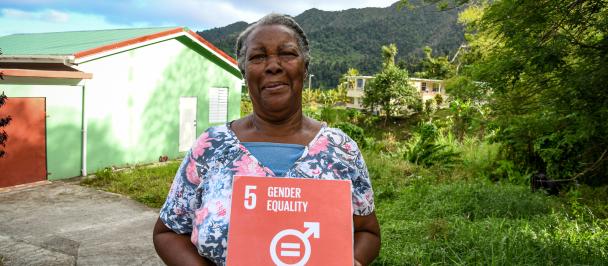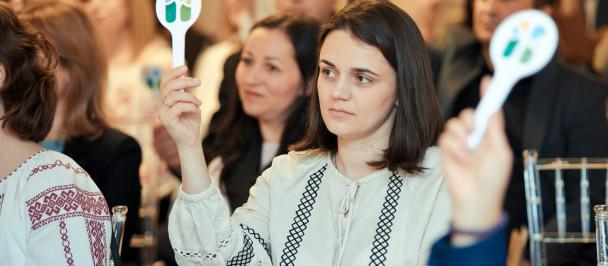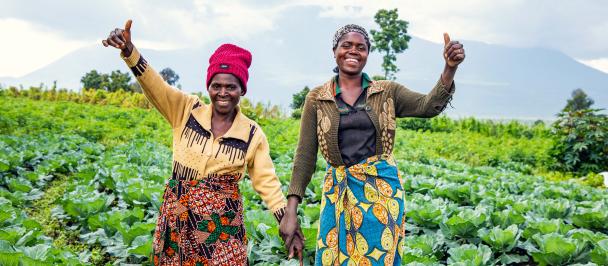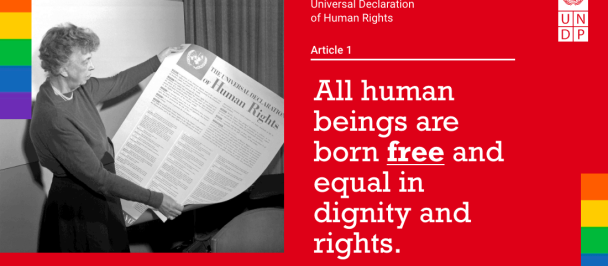Statement to the UNDP Executive Board New York, 6 September 2018
Statement to the UNDP Executive Board
September 6, 2018
As prepared for delivery.
Video of the Administrator's delivered speech.
I am pleased to welcome you to this second regular session of the UNDP Executive Board.
We are meeting at a critical juncture for the UN, its development system and the future of UNDP. Together with you - as members of the Executive Board and custodians of UNDP – I, together with my team, look forward to our deliberations.
At the outset, I would like to take this opportunity to introduce the new members of our UNDP leadership team: Ahunna Eziakonwa, Director of the Regional Bureau for Africa; Luis Felipe Lopez-Calva, Director of the Regional Bureau for Latin America and the Caribbean; Ulrika Modéer, Director of the Bureau of External Relations and Advocacy; and Asako Okai, Director of the Crisis Bureau; and Mirjana Spoljaric Egger, Director of the Regional Bureau for Europe and the Commonwealth of Independent States. Please join me in welcoming them all to UNDP. I’m very pleased to say we have reached gender parity in my senior management team.
1. The Promise of the UNDP Strategic Plan 2018-2021
Ten months ago, as we jointly launched the new Strategic Plan, we promised you to embark on a transformation of UNDP into the world’s most forward-looking, most widely networked development organization, one that could deliver 21st century solutions to the complex development challenges countries are tackling – whether eradicating poverty, overcoming economic crises or navigating massive transitions.
The timing is opportune. The U.N. Secretary-General, with support from governments, has embarked on a deep reform of the UN development system (UNDS), transforming its structure, leadership and accountability mechanisms.
An effective UNDS reform needs a strong and aligned UNDP. Through the Strategic Plan, we’ve unleashed a process of reflecting, rethinking and refocusing the organization, evolving it from a classic development agency mode into a cutting-edge provider of development advice and an organization that is able to instantly help connect countries to the world, knowledge resources and networks of best practice they need for achieving development breakthroughs.
2. Progress is happening, fast and from the grassroots
Ten months on, with your strong support, we have begun to redraw the boundaries of what UNDP can achieve. Building on our unparalleled country presence and capacity – traditionally our greatest asset - we are equipping UNDP to better mobilize, connect and innovate. That change began here through the Executive Board but is now materializing rapidly and progressively at the grassroots, repositioning UNDP’s leadership capacity and potential in development.
The UNDP Strategic Plan made 4 critical commitments:
Commitment number 1: “Strengthen UNDP’s relevance as a trusted partner in a complex and evolving development landscape, strongly committed to its mandate to eradicate poverty”
• The 6 signature solutions are already being applied at country level, combining modular solutions for unique country contexts. All of the Country Programme Documents being presented at this Board meeting have taken the solutions on board, adapted to each national context, based on national priorities;
• Our country platforms are taking shape, facilitating new ways of collaborating within and across government and society in pursuit of greater development achievements in the networked age. At least 50 countries where UNDP has a physical presence will have established at least one or more platforms by the end of the Strategic Plan in 2021;
• Another milestone has been the fundamental redesign and reconfiguration of UNDP’s expertise into a Global PolicyNetwork (GPN) and a cadre of SDG experts that are better suited to address complex problems quickly. The GPN integrates the structures, capacities and expertise of the Bureau for Policy and Programme Support (BPPS) and Crisis Response Unit (CRU), and links it to UNDP’s unparalleled reservoir of expertise and people working at national level;
• Already a major supporter of climate action in 140 countries, UNDP’s current direct support to implementation of Nationally Determined Contributions (NDCs) will be doubled from 31 to over 60 countries.
• We have completed and will this Friday launch UNDP’s third Gender Equality Strategy, committing UNDP to a new and unprecedented level of targets and indicators in performance and implementation. I am personally chairing our Gender Steering Committee which meets twice annually to monitor progress and hold our senior managers accountable.
• We are stepping up our partnerships, including with other UN entities. In July 2018, UNDP and UN Women signed a Memorandum of Understanding to increase their collaboration on areas such as ending violence against women; strengthening collaboration in crises and fragile states; promoting women’s political leadership and working together to promote gender equality in the private sector and in the field of sustainable energy. Similar partnership agreements have been concluded with the World Health Organization (WHO), the UN High Commissioner for Refugees (UNHCR), the UN Office of Counterterrorism, and the World Meteorological Organization (WMO).
• We are firmly focused on promoting South-South and Triangular Cooperation, including through our hosting of the UN Office for South-South Cooperation: in 2017, UNDP reported close to 500 such projects and programmes across 127 countries. The 40th anniversary of the Buenos Aires Plan of Action will be a critical opportunity to further this important agenda together with partner countries.
Country platforms
• In Moldova, innovation labs aim to improve public services, help SMEs innovate and create ‘smart cities’. UNDP has started to work on the country’s first-ever electric vehicle infrastructure. That system aims to make charging stations profitable and sustainable;
• In Colombia, in the wake of the peace accord and together with the rest of the UN family, UNDP is now working with private funds to scale up investments designed to bring rural areas out of poverty, following more than 50 years of violence; and
• In Indonesia, new ground is being broken to tap the potential of Islamic finance – known as Zakat - for the SDGs. Zakat is currently estimated to be worth US$16 billion.
Commitment number 2: “Be more nimble, innovative and enterprising – a thought leader that succeeds in taking and managing risks”
The SDGs and the current development context demand new, more agile and more inclusive platforms and modalities. UNDP has initiated a range of innovation-oriented tracks and platforms that will enable it to rapidly offer new services to countries, the UN family, and the international development community. We are embracing the challenge of rethinking development cooperation by combining tried and tested approaches with emerging lessons on innovation and scaling up for concrete results on the ground.
[Introduction of Bangladesh live link]
Innovation Facility Snapshot
• In the Maldives, we are now using drones to map areas at risk of rising seas across 160 islands;
• In Sudan, behavioral design is being used to prevent people from lapsing back into radicalism.
• The Innovation Facility has invested into at least 140 groundbreaking experiments across 85 countries since 2014, supported by the Government of Denmark. Vital lessons and results driving our future-focused strategy are laid out in our latest report, ‘Moonshots and Puddle Jumps – Innovation for the Sustainable Development Goals’ to be launched today.
• UNDP’s Country Investment Facility of $20 million was launched in March 2018. UNDP offices were invited to submit compelling proposals for innovation funding. Within 12 weeks, the CIF had received proposals from 58 country offices for 63 projects, and approved and released funding for projects in 49 countries – a new record;
• On 25 September we are launching SDG Impact, a start-up whose aim will be to significantly increase private investment towards SDG achievement. Building on our extensive knowledge and experience, and credibility as a neutral partner to over 170 governments, we will do so by offering private sector investors and partner countries a set of impact intelligence tools and services to help them better target their investments for achieving concrete development outcomes. [see box]
• Through Project Catalyst, we are working with a small team of experts and partners who dedicate 100% of their time to generate insights into the development trends and solutions of tomorrow for which UNDP and partner countries must develop new strategies and responses;
• Over 900 staff now participate on average in our monthly innovation calls, presenting UNDP innovation and partnerships that have proved ‘game changing’.
Lion’s Share
The Lion’s Share initiative, a wildlife conservation fund, was launched jointly by UNDP and its private sector partners in June, and capitalized by advertisers donating a fee when images of animals are used in advertisements. The work of the Multi Partner Trust Fund Office is instrumental in these efforts.
3. Meanwhile, UNDP continues to innovate its business model and process while delivering a growing portfolio of projects and programmes
Commitment number 3: “Enabling UNDP Delivery of the Strategic Plan and the 2030 agenda: a new business model for UNDP”.
Over the last year, we have taken significant steps to improve our business model, and while I have spoken about the innovations side, there has also been good progress on the performance side to become more effective, efficient, and results oriented.
First, our commitment to prudent financial management - a hallmark of UNDP’s financial stewardship - remains steadfast, made possible by core resources generously provided by Member States.
Important achievements include:
• A major turnaround in our financial situation by closing the 2017 year-end. This was accomplished by implementing a rigorous cost-cutting and savings exercise in 2017 to avert a projected $30-$50 million deficit. We are projecting a similar surplus year for 2018.
• While the new SP and UNDS reform have required significant additional effort from our teams and partners, UNDP continued to maintain and improve on the delivery of its current portfolio increasing from $4.6 billion in 2017 and projected to potentially increase to $4.9 billion in 2018, comprised of over 4,500 projects in 170 countries, supported by 17,000 staff and a wide number of partnerships. It represents not only a significant increase in productivity and delivery but in combination with a number of reforms already deployed, it demonstrates tangible results in terms of enhanced performance, cost savings and efficiency.
• Another critical turnaround with the highest cumulative General Management Support (GMS) ‘earnings’ since we started tracking this in detail in 2014 (end of July 2018 data). While only one indicator of the financial health of the organization, this shows our project delivery to be accelerating, which means we are providing more support to our partners than ever before, and the confidence of donors in our work;
• 13 consecutive years of unqualified audit opinions by the UN Board of Auditors on UNDP’s financial statements;
• We have maintained our top standing as one of the world’s most transparent aid organizations, and have steadily increased our ratings since 2014.
• Satisfactory audit opinion by the Office of Audit and Investigations (OAI) on the adequacy and effectiveness of UNDP’s governance, risk management and control (GRC) framework;
• And, as I promised to you, we will not be tapping into the $29 million allocated for transition measures for my first year in office.
Second, a significant element of the new business model work was the completion of the review of our Management Servicesbetween April and July through a wide ranging and highly consultative process.
• Implementation of the recommendations is under way including: improving and expanding our use of shared services modalities in delivering operational service; digitalizing UNDP; and strengthening the ability of our country offices to make sure their services are both world-class and appropriately priced.
• We are also working closely with our UNCT partners in the provision of these services. To this end, we have created new software that compares the quality and cost of services across UN entities at the country level. This is the first time an objective comparison of country-level UN services has been possible.
• The roll-out of our new approach to Programme and Project Management (PPM) saw us rewriting the rule book on how to do programmes. By eliminating redundant administrative processes and barriers to creativity and efficiency, resulting in an average saving of 33 days per year for every project staff;
• Over 20 business process are being improved; these encompass a significant number of our day to day transactions and demonstrate our commitment to continual improvement; there is still work ongoing for the full business process streamlining;
• We manage the largest portfolio of procurement services for other UN agencies, manage payroll for 17,000 non-UNDP staff and have a Treasury function effectively managing 3 billion dollars of other agencies assets while operating in 117 currencies.
Third, on our people management, we have initiated an overhaul of our Human Resource approach with a new People Strategy forthcoming, following the appointment of a new Director for Human Resources.
• Our new senior management team is now in place and we have achieved 50-50 parity at the ASG level.
• Our new Gender Parity Strategy aims to achieve full parity at senior levels by 2021 and also at all levels across the organization and achieve equal rights and opportunities for all people working in UNDP irrespective of their gender identity
• Tackling sexual harassment and sexual exploitation and abuse emerged as a key priority. I take this as a very personal responsibility. Following a joint management and staff review, a series of specific measures – from new policies and recourse measures to a 24-hour independent helpline- were implemented.
On funding the Strategic Plan:
• Our core resources were set to increase for the first time since 2013, reaching an estimated $630 million this year ($18 million higher than 2017). However, a number of donors have signaled new uncertainty in recent weeks linked to UNDS reform;
• The core/non-core imbalance needs to be urgently addressed. In 2017 the ratio of regular to other resources widened to 12:88. Just fifteen donor governments provided 73% of UNDP’s total funding, and 93% of its regular resources. Predictability and flexibility are important too.
• A first in linking transparency and accountability in UNDP: In July, we linked our Integrated Results and Resources Framework with our portfolio of programs and projects. For the first time, we can now analyze the results to be achieved against current planned budget and pipeline resources across the Strategic Plan 3 outcome areas, 6 signature solutions and 27 outputs, along with our contribution to SDG targets.
4. We are carrying the UNDS reform forward while creating a new UNDP
Contributions
• The Governments of Germany, Luxembourg, Norway, Japan and Sweden have all increased their core contributions in 2018. This is proof that these governments value UNDP and our work as a means of achieving our common objectives.
• Thank Antigua and Barbuda, Australia, Belgium, Canada, Denmark, Netherlands, New Zealand and Switzerland for their multi-year commitments which helped to improve predictability of funding in 2017. In 2018, we welcomed a two-year pledge from Sweden and a renewal of a three-year commitment with Switzerland. We also look forward to soon signing a three-year agreement with the UK and the Netherlands.
• We also appreciate the support of the 54 partners who continue to prioritize flexible funding through their contributions to regular resources in 2017, and welcome increases from Estonia, Japan, Pakistan, Republic of Korea and Sweden.
Commitment number 4: “We will help shape a United Nations development system that responds to our changing world”
I look forward to discussing this issue in more detail shortly at the lunch time session.
The UNDS reform is a major turning point for UNDP, presenting the organization with huge challenges as well as significant opportunities.
• Since the adoption of GA Resolution 72/279, UNDP has deployed significant personnel and institutional resources to support the SG’s transition team. UNDP now has a full-time team to facilitate the transfer of 129 RCs positions and hundreds of Resident Coordinator Offices (RCO) and DOCO staff positions to their future contractual arrangements, effective 1 January, 2019;
• UNDP will double its contribution through the UNDS cost-sharing mechanism to $12 million per annum and will also provide operational support for a transitional period. The service level agreement under negotiation with the UN Secretariat will establish the future operational support needed from UNDP.
• As a result of the de-linking, UNDP must now implement an accelerated assessment and recruitment process for its topline managers at country level. More than 100 Resident Representatives need to be identified, assessed and appointed. We envisage having completed the assessment and appointment of new UNDP RRs by December 2018.
• We are firmly focused on measuring up to the task of providing the United Nations development system with the support platform and integrator function called for in the GA resolution. This is a natural role for UNDP, echoing our multi-sectoral mandate, extensive network of country offices, and wide-ranging development partnerships but will also require new services and skills. The UN Volunteers Programme (UNV), the UN Capital Fund (UNCDF), the UN Office for South-South Cooperation, and the Multi Partner Trust Fund Office (MPTFO), all hosted by UNDP, provide significant potential for further synergies and offer enormous potential for reinforcing this role.
• While funding the coordination function is important, we strongly appeal to you to ensure that it does not come at the expense of actual implementation of development support on the ground. A well-funded UNDP, with strong programmatic and substantive direction, is also essential to the strategic leadership of the Resident Coordinator.
Conclusion:
Over the past 10 months we have embarked on rapid and focused implementation of the Strategic Plan. In presenting the initial results and milestones I believe we have delivered on our promise of implementing not only a growing portfolio of projects and programmes in 2017/2018, but also a deep and transformational shift in what UNDP’s next generation offer to countries, the UN family, and the donor community will be in the years to come.
We accomplished this while cutting our costs and managing a major and challenging UNDS reform transition that is affecting every aspect of UNDP’s global operations.
The Strategic Plan set out a vision and a pathway for UNDP during the 2018-21 period. It also created an accountability framework. It is also a governance compact among you as Member States. As we move forward we look to you as Executive Board to ensure that the capacity and resources for UNDP to deliver on its mandate and foundational role for the UN development system are secure.
Click to enlarge

 Locations
Locations



